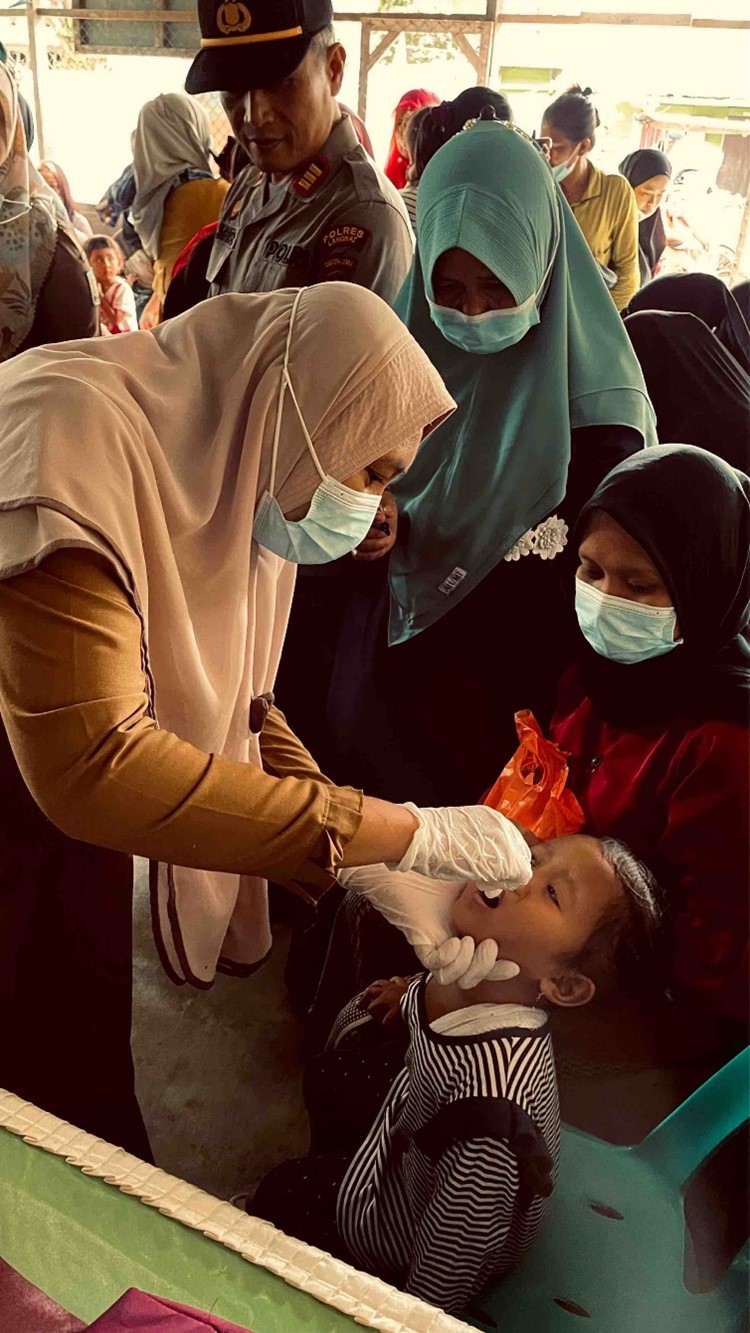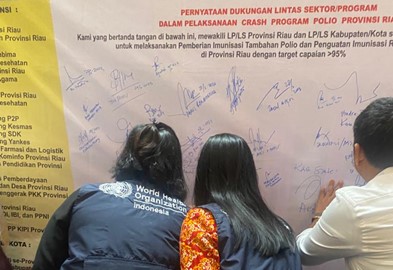Widespread outbreaks of vaccine-preventable diseases in various districts and provinces across Indonesia in 2023 posed numerous challenges to health authorities. For instance, North Sumatra struggled to achieve the target immunization coverage and faced, particularly in areas close to Aceh, an increased risk of polio transmission. Parents' reluctance towards vaccination in West Sumatra and Riau caused different challenges to the polio immunization campaign. In Riau, there were additional hurdles, such as a hesitancy among health workers to administer multiple injections and a lack of commitment from provincial leadership. In several provinces like South Papua, grappling with a measles outbreak, security and budget constraints emerged as the main challenges.
To overcome these diverse and unique challenges, WHO worked closely with the Ministry of Health (MoH), provincial health offices (PHOs), district health offices (DHOs) and primary healthcare centres (Puskesmas).

Local midwives vaccinating children (0-59 months) as part of the polio outbreak response in Indonesia. Through a series of information sharing sessions supported by WHO, many midwives became confident in delivering immunization services. Credit: WHO/Stella Benita
In North Sumatra's Medan, WHO collaborated with the DHO and Puskesmas to conduct house-to-house visits as part of a local polio vaccination campaign. They also coordinated with various stakeholders, including local government, cadres, women's welfare organizations, private sector, and health professionals to improve community acceptance. This collaboration contributed to a significant increase in polio vaccination coverage (96.5%) in the city, protecting 161 019 children and setting a precedent for regions facing similar challenges. In Besitang sub-district of Langkat district next to Aceh, Langkat DHO and WHO conducted monitoring visits to Puskesmas, seeking support for the polio campaign and boosting confidence of health workers and cadres. By the end of the campaign in May 2023, out of 88 409 targeted children, Langkat district achieved an impressive 100% coverage for the first dose of polio vaccination, and 95.3% for the second dose.
Eni Purwanti, immunization staff of Langkat DHO, expressed gratitude for WHO's support in Besitang, stating: “Collaboration is essential to ensure comprehensive Polio immunization coverage in Langkat, especially given our proximity to Aceh, and the need to prevent the spread of polio.”
In Bukittinggi City, West Sumatra, low coverage prompted a strategic intervention to build trust and understanding within diverse communities. An advocacy meeting orchestrated by the MoH, WHO, and UNICEF engaged offices of Education, Religious Affairs, Social Affairs, and community leaders to address hesitancy and rejection. Strategic initiatives, including village-level collaboration, sweeping activities, and vaccination posts in public areas, were implemented. The involvement of local leaders in socializing and educating the community proved pivotal. WHO's support contributed to Bukittinggi’s success in increasing polio vaccination coverage almost threefold, protecting 14 742 children in the district.

Commitment signing by WHO and high-level health authorities in Riau Province. Credit: WHO/Yurniati
Such coordination meetings also helped bring unprecedented support in Boven Digoel District, South Papua. Convinced that adequate outbreak response immunization must be supported by an adequate budget, the District Government allocated IDR 1 billion for the measles vaccination campaign. The police and military leaderships realized they could help solve security issues and sent their personnel to accompany immunization activities in the district. The immunization campaign ended in July 2023 and exceeded its goal by reaching 4 875 children, surpassing the target of 4 347 by 112%.To secure high-level commitment in Riau, cross-sectoral coordination meetings involving the provincial secretary, district representatives, police, military, and health professionals were crucial. The Ministry of Health, PHO Riau, and WHO actively engaged participants, providing insights into the global polio situation and the urgency of the outbreak response. Commitment walls, circular letters, and videos from local leaders demonstrated a unified commitment to the immunization effort, leading the province to protect 709 751 children against polio virus by May 2023.
The collective stories from across the archipelago underscore the significance of collaboration, commitment, and swift responses in the battle against vaccine-preventable diseases. The commitment shown at all levels reflects not only the urgency to eliminate vaccine-preventable diseases but also the broader goal of safeguarding the health and future of Indonesia's children. WHO will continue to assist Indonesia in striding forward in its dedication to building a healthier future for all.
Supported by the Australian government and the United States of America, through USAID.
Written by the following WHO Indonesia personnel:
Candora A Tambunan, Dedy Purwito, Dewi Ayu Kusumawardhani, I Gede Bayu Eka Putra Wibowo, Indreni Waridjo, Novi Anggraeni, and Stella Benita; Vaccination Technical Officers; and Olivi Silalahi, National Professional Officer for Routine Immunization
